My Hopes and Fears for the 2020s
Today is January 1st, 2020 - the start of a new decade! Should we call this the twenty twenties, the two thousand twenties, the twenties, or something else? In a short time, this will be sorted out, so please forgive me for wondering about this minor detail on the first day of this decade. My head is always in the clouds, so I don't need an excuse to reflect on the past and ponder about the future but I'm not going to pass up on this once in a decade opportunity to lay down my thoughts in a formal way. Anyway, I spent a few hours jotting down a few thoughts today (in no particular order), and I'm anticipating thoroughly enjoying reading through this post 10 years from now.
Infrastructure
 If there were ever a no brainer public investment it would have to be infrastructure. It's like a giant Archimedes Lever for the economy and keeps people, goods, and services moving. It's the one thing that makes me jealous of China being run by authoritarian engineers. However, it's something the US does way too little of and at a terribly high cost. I hope that in the 2020s the US can figure out how to bring our infrastructure costs in line with the rest of the developed world and make massive public investments in rail, bridges, tunnels, internet connectivity, ports, subways, and beyond. I fear that nothing will change and the US will lag further and further behind its peer countries.
If there were ever a no brainer public investment it would have to be infrastructure. It's like a giant Archimedes Lever for the economy and keeps people, goods, and services moving. It's the one thing that makes me jealous of China being run by authoritarian engineers. However, it's something the US does way too little of and at a terribly high cost. I hope that in the 2020s the US can figure out how to bring our infrastructure costs in line with the rest of the developed world and make massive public investments in rail, bridges, tunnels, internet connectivity, ports, subways, and beyond. I fear that nothing will change and the US will lag further and further behind its peer countries.
Immigration
 In the last decade, the global movement of people became a huge flashpoint - from Syrian refugees in the EU to Brexit to the asylum seekers at the US Southern Border. Humans have always migrated, and there is no reason to see that stopping any time soon. However, the current global governance system of nation-states is falling short in providing legal opportunities for people to relocate to seek a better life. Furthermore, for every one person who illegally immigrates across borders, I'd guess there are 10 or 100 times more people who want to but are too risk-averse to do so. It's a shame that most people are trapped in their country of birth, especially because far too many countries are not places of abundance and opportunity like the US is. My hope for the 2020s is that we as a global community find new and creative solutions to this pent up demand for immigration, instead of letting it tear us apart over nasty political fights about how to handle people showing up illegally. My fear is that immigrants will be further demonized, legal avenues to immigration will be shut down, and everyone will be a loser in a world with less freedom of movement.
In the last decade, the global movement of people became a huge flashpoint - from Syrian refugees in the EU to Brexit to the asylum seekers at the US Southern Border. Humans have always migrated, and there is no reason to see that stopping any time soon. However, the current global governance system of nation-states is falling short in providing legal opportunities for people to relocate to seek a better life. Furthermore, for every one person who illegally immigrates across borders, I'd guess there are 10 or 100 times more people who want to but are too risk-averse to do so. It's a shame that most people are trapped in their country of birth, especially because far too many countries are not places of abundance and opportunity like the US is. My hope for the 2020s is that we as a global community find new and creative solutions to this pent up demand for immigration, instead of letting it tear us apart over nasty political fights about how to handle people showing up illegally. My fear is that immigrants will be further demonized, legal avenues to immigration will be shut down, and everyone will be a loser in a world with less freedom of movement.
Health Care Costs
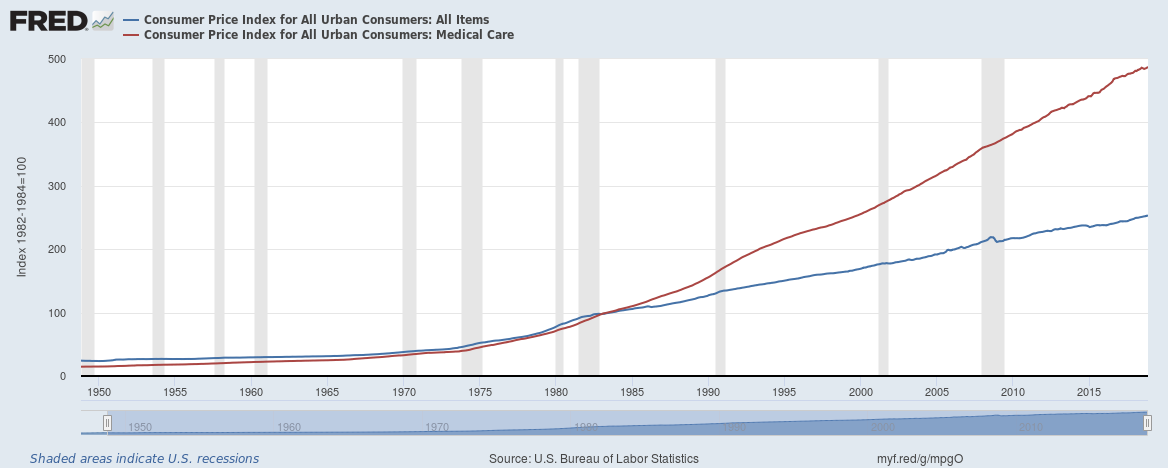 The US has outrageous health care costs - double to the OECD. The past decade was spent engaging in an enormous political fight over expanding health care access and instituting some basic protections. Things are definitely better today than 10 years ago - tens of millions more people have access to health care, and hundreds of millions can breathe a sigh of relief knowing they can't be kicked off their plan if they get cancer. Having said that, the fundamental problem of controlling health care costs remains unresolved and must be dealt with. My hope is that we can finally put the fight over the Affordable Care Act to rest and do something to not just "bend the cost curve" but break it. My fear is that the status quo wins and health care costs will be worse 10 years from now.
The US has outrageous health care costs - double to the OECD. The past decade was spent engaging in an enormous political fight over expanding health care access and instituting some basic protections. Things are definitely better today than 10 years ago - tens of millions more people have access to health care, and hundreds of millions can breathe a sigh of relief knowing they can't be kicked off their plan if they get cancer. Having said that, the fundamental problem of controlling health care costs remains unresolved and must be dealt with. My hope is that we can finally put the fight over the Affordable Care Act to rest and do something to not just "bend the cost curve" but break it. My fear is that the status quo wins and health care costs will be worse 10 years from now.
Health
 Separate from the issues surrounding health care costs and how to pay for it, the US population is extraordinarily unhealthy. The US is a leader when it comes to obesity and chronic diseases such as diabetes. People in the US have shorter lives with even shorter healthspans than other OECD countries. This isn't just something that can be waved away with a magic wand - unhealthy diet and exercise habits are deeply embedded into the culture. The portions are outrageous, everything is fried, most of the food consumed is processed, people "cook" via the microwave or delivery on the off chance they don't eat out, and instead of walking and moving and exercising people are sedentary and even fight over parking spaces at the gym (for the few that go)! Other countries are not like this, but the US has unfortunately exported this lifestyle and it's slowly growing around the world. I hope that in the 2020s that more people, myself included, embrace a lifestyle centered around health, wellness, exercise, and self-love. I fear that the ubiquity of cheap delicious processed food is going nowhere, obesity and its related diseases will continue to rise, people will care more about fat-shaming than obesity reduction and that the only way to avoid becoming part of the obese majority is to either win the genetic lottery or literally leave the country.
Separate from the issues surrounding health care costs and how to pay for it, the US population is extraordinarily unhealthy. The US is a leader when it comes to obesity and chronic diseases such as diabetes. People in the US have shorter lives with even shorter healthspans than other OECD countries. This isn't just something that can be waved away with a magic wand - unhealthy diet and exercise habits are deeply embedded into the culture. The portions are outrageous, everything is fried, most of the food consumed is processed, people "cook" via the microwave or delivery on the off chance they don't eat out, and instead of walking and moving and exercising people are sedentary and even fight over parking spaces at the gym (for the few that go)! Other countries are not like this, but the US has unfortunately exported this lifestyle and it's slowly growing around the world. I hope that in the 2020s that more people, myself included, embrace a lifestyle centered around health, wellness, exercise, and self-love. I fear that the ubiquity of cheap delicious processed food is going nowhere, obesity and its related diseases will continue to rise, people will care more about fat-shaming than obesity reduction and that the only way to avoid becoming part of the obese majority is to either win the genetic lottery or literally leave the country.
Education
 I live in a bubble surrounded by well-educated people so I was a bit caught off guard when I learned that only 36% of Americans can name the three branches of government. At the same time the US population seems alarmingly uneducated, more people than ever are going to college and being crushed in debt by rising tuition (even preventing a young Elon Musk from buying a 2nd PC back in the day). My friends in the K-12 education world think dysfunctional school culture is at the heart of poor primary and secondary education performance. I was one of the first people crazy enough to attend a coding boot camp back in 2013, so I'm bullish on the prospects of new forms of education such as Georgia Tech's online Masters degree in Computer Science. I hope that in the 2020s discussions around education reform center around school culture for primary and secondary schools, and radical cost reduction for higher education and lead to real positive changes in the quality and cost of these two forms of education respectively. I fear that the status quo of arguing about testing, teacher's unions, and funding levels will distract from the hard work that needs to be done to change school culture and replace large swaths of overpriced colleges with online or hybrid options.
I live in a bubble surrounded by well-educated people so I was a bit caught off guard when I learned that only 36% of Americans can name the three branches of government. At the same time the US population seems alarmingly uneducated, more people than ever are going to college and being crushed in debt by rising tuition (even preventing a young Elon Musk from buying a 2nd PC back in the day). My friends in the K-12 education world think dysfunctional school culture is at the heart of poor primary and secondary education performance. I was one of the first people crazy enough to attend a coding boot camp back in 2013, so I'm bullish on the prospects of new forms of education such as Georgia Tech's online Masters degree in Computer Science. I hope that in the 2020s discussions around education reform center around school culture for primary and secondary schools, and radical cost reduction for higher education and lead to real positive changes in the quality and cost of these two forms of education respectively. I fear that the status quo of arguing about testing, teacher's unions, and funding levels will distract from the hard work that needs to be done to change school culture and replace large swaths of overpriced colleges with online or hybrid options.
Race Relations in the US
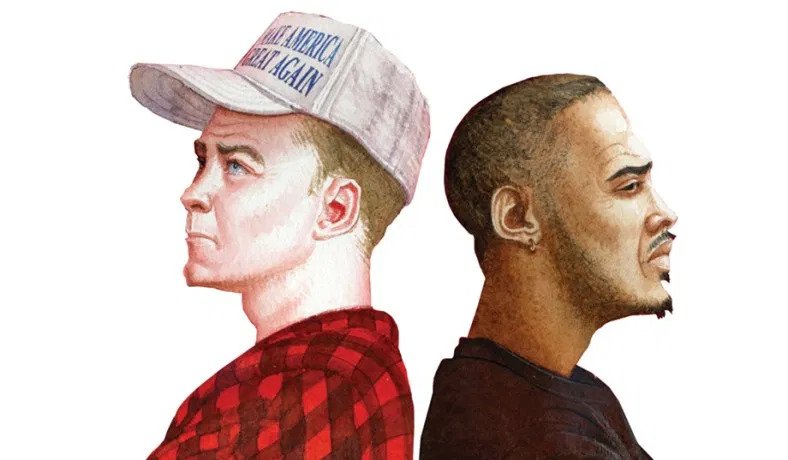 It's impossible to think about the history of the US without thinking about race - the genocide of the natives, hundreds of years of slavery, the Chinese exclusion act, Jim Crow, the internment of Japanese during WWII, and on and on. We treat each other better today, but the wounds of the past are not healed and may never heal. One of the most shocking and depressing things about the 2010s was the deterioration of race relations. I was elated and extremely proud to be an American when Barack Obama was elected in 2008. But, unbeknownst to me, the resentment that his election triggered is ultimately what propelled Donald Trump - a bona fide racist and birther - into office. I'd argue that the US's biggest strength is that we are a nation of ideas and ideals, not a single people. This freedom to be yourself, not to conform to rigid cultural practices of the past, and to interact with people very different from you has amazing benefits. I hope that in the 2020s people in the US calm down, turn down the anger, listen to each other, try to heal the wounds of the past and address the relevant racial issues of today such as the wealth gap. Instead I fear that tribalism will continue to rule the day, that Americans will turn on each other, that the scourge of White Supremacy will keep rising, and that as bad as things are today - race relations will continue to get worse.
It's impossible to think about the history of the US without thinking about race - the genocide of the natives, hundreds of years of slavery, the Chinese exclusion act, Jim Crow, the internment of Japanese during WWII, and on and on. We treat each other better today, but the wounds of the past are not healed and may never heal. One of the most shocking and depressing things about the 2010s was the deterioration of race relations. I was elated and extremely proud to be an American when Barack Obama was elected in 2008. But, unbeknownst to me, the resentment that his election triggered is ultimately what propelled Donald Trump - a bona fide racist and birther - into office. I'd argue that the US's biggest strength is that we are a nation of ideas and ideals, not a single people. This freedom to be yourself, not to conform to rigid cultural practices of the past, and to interact with people very different from you has amazing benefits. I hope that in the 2020s people in the US calm down, turn down the anger, listen to each other, try to heal the wounds of the past and address the relevant racial issues of today such as the wealth gap. Instead I fear that tribalism will continue to rule the day, that Americans will turn on each other, that the scourge of White Supremacy will keep rising, and that as bad as things are today - race relations will continue to get worse.
China
 Probably one of the most important trends of this century is the rise of China. That obviously will continue in the 2020s, but the question is how. Will China rise peacefully, or will there be conflict? Will China prematurely take over Hong Kong or honor the 2047 date? Will China continue to export authoritarianism or become a democracy? Will China overtake the US as the global economic and military superpower, or will we revert to a bipolar world like during the Cold War? There are a million more questions along these lines on trade policy, intellectual property, scarce resource usage, carbon emissions, Tibet, Taiwan, North Korea etc - but make no mistake what China does will be central to how the world operates. I hope that in the 2020s that China rises peacefully and is gentler to its own citizens. I fear that China's treatment of its Uyghur minority population is just the canary in the coal mine and things could get really bad really fast, especially if there is some sort of crisis.
Probably one of the most important trends of this century is the rise of China. That obviously will continue in the 2020s, but the question is how. Will China rise peacefully, or will there be conflict? Will China prematurely take over Hong Kong or honor the 2047 date? Will China continue to export authoritarianism or become a democracy? Will China overtake the US as the global economic and military superpower, or will we revert to a bipolar world like during the Cold War? There are a million more questions along these lines on trade policy, intellectual property, scarce resource usage, carbon emissions, Tibet, Taiwan, North Korea etc - but make no mistake what China does will be central to how the world operates. I hope that in the 2020s that China rises peacefully and is gentler to its own citizens. I fear that China's treatment of its Uyghur minority population is just the canary in the coal mine and things could get really bad really fast, especially if there is some sort of crisis.
Narrow AI
 There's been a ton of hype around narrow artificial intelligence and machine learning, and some small wins in the 2010s, but I suspect that the 2020s will see a lot more useful applications of narrow AI. Self driving cars being the obvious one, and I'm optimistic that we will finally see some long awaited medical breakthroughs using big data. I hope that narrow AI starts delivering more substantial innovations in the 2020s and that we have a political system that can constructively incorporate these gifts instead of treating them with hostility. I fear that narrow AI will either disappoint and not deliver or we will be too petty and close-minded to make use of the abundance it can unlock.
There's been a ton of hype around narrow artificial intelligence and machine learning, and some small wins in the 2010s, but I suspect that the 2020s will see a lot more useful applications of narrow AI. Self driving cars being the obvious one, and I'm optimistic that we will finally see some long awaited medical breakthroughs using big data. I hope that narrow AI starts delivering more substantial innovations in the 2020s and that we have a political system that can constructively incorporate these gifts instead of treating them with hostility. I fear that narrow AI will either disappoint and not deliver or we will be too petty and close-minded to make use of the abundance it can unlock.
Cryptocurrency
 I found an email from 2013 I sent to one of my friends asking to set up a time to talk about bitcoin. I didn't end up having that discussion or buying any bitcoin then - major oops. Some people I really respect are extremely bullish on cryptocurrency, especially as a hedge against an increasingly chaotic world. As of now, cryptocurrency remains a speculative investment, not a true currency. I'm extremely ambivalent about its future, which maybe is a signal in and of itself that I just don't know how to interpret. I'm toying with the idea of setting aside a few percent of each paycheck into cryptocurrency but have yet to actually implement that. I hope that in the 2020s cryptocurrency will either become a widespread, useful currency or just die out so we can end this endless speculation. I fear that cryptocurrency will dramatically increase in value and I didn't buy enough while it was still "cheap in 2020".
I found an email from 2013 I sent to one of my friends asking to set up a time to talk about bitcoin. I didn't end up having that discussion or buying any bitcoin then - major oops. Some people I really respect are extremely bullish on cryptocurrency, especially as a hedge against an increasingly chaotic world. As of now, cryptocurrency remains a speculative investment, not a true currency. I'm extremely ambivalent about its future, which maybe is a signal in and of itself that I just don't know how to interpret. I'm toying with the idea of setting aside a few percent of each paycheck into cryptocurrency but have yet to actually implement that. I hope that in the 2020s cryptocurrency will either become a widespread, useful currency or just die out so we can end this endless speculation. I fear that cryptocurrency will dramatically increase in value and I didn't buy enough while it was still "cheap in 2020".
Arrested Development
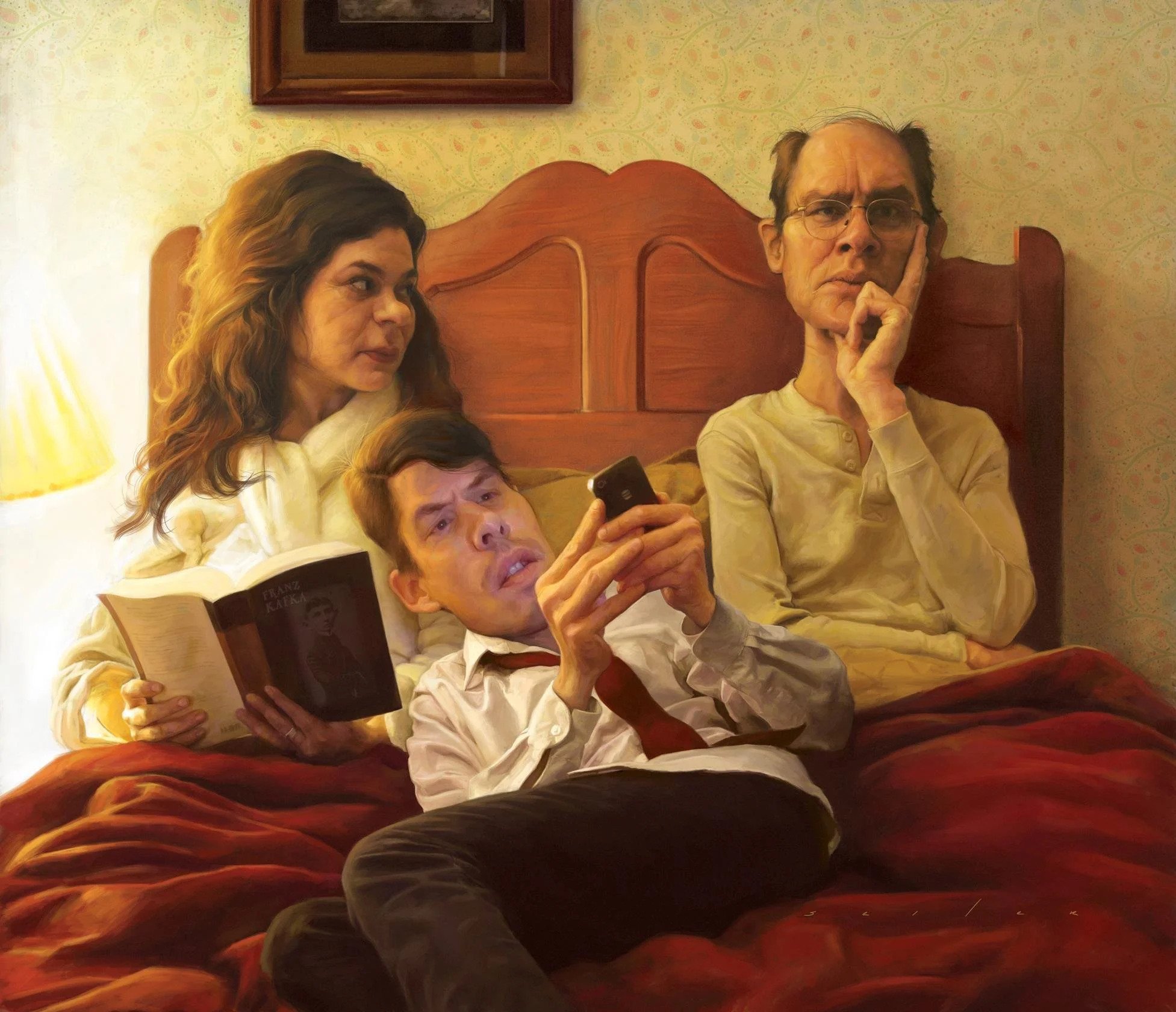 The last decade was shaped by the aftermath of the Great Recession, which resulted in more young adults living with their parents than their partner. This, in turn, seems to be part of the reason people have kids later - if at all and marrying later than ever. We are well out of the Great Recession, and times are relatively good for young people in terms of economic opportunities, yet these life milestones are still being delayed. Perhaps it's due to the burden of student debt or the high cost of housing that's holding young people back. However, I suspect this is a longer-term trend of extending the period of our lives that we are fully biologically grown but deemed not mature enough by society to be an adult. This can be seen in the recent ban of purchasing tobacco for those under 21 as just the latest example of our society deeming young people unable to make decisions for themselves (notice there was not a smoking maximum age, which honestly makes more sense since older people are more fragile and shouldn't inhale toxic fumes). While I'm all for the freedom to have this extended adolescence, I hope that in the 2020s at least some of these trends such as living with your parents into your 30s reverse and age-related discriminatory laws get wiped off the books - but I'm not holding my breath. I fear, and strongly suspect, that this is just the new normal, and as a result, young people will suffer from what George W. Bush would call the "soft bigotry of low expectations".
The last decade was shaped by the aftermath of the Great Recession, which resulted in more young adults living with their parents than their partner. This, in turn, seems to be part of the reason people have kids later - if at all and marrying later than ever. We are well out of the Great Recession, and times are relatively good for young people in terms of economic opportunities, yet these life milestones are still being delayed. Perhaps it's due to the burden of student debt or the high cost of housing that's holding young people back. However, I suspect this is a longer-term trend of extending the period of our lives that we are fully biologically grown but deemed not mature enough by society to be an adult. This can be seen in the recent ban of purchasing tobacco for those under 21 as just the latest example of our society deeming young people unable to make decisions for themselves (notice there was not a smoking maximum age, which honestly makes more sense since older people are more fragile and shouldn't inhale toxic fumes). While I'm all for the freedom to have this extended adolescence, I hope that in the 2020s at least some of these trends such as living with your parents into your 30s reverse and age-related discriminatory laws get wiped off the books - but I'm not holding my breath. I fear, and strongly suspect, that this is just the new normal, and as a result, young people will suffer from what George W. Bush would call the "soft bigotry of low expectations".
Innovation
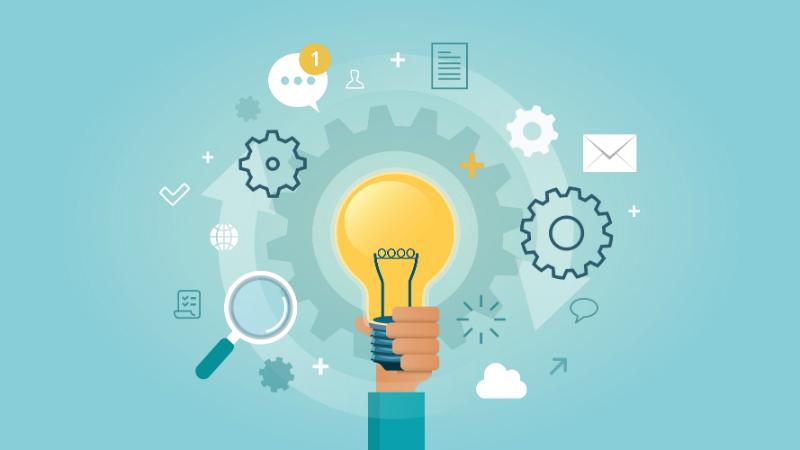 The rise of smartphones over the past 10 years has been exciting to watch and extremely empowering to the billions of us who use them hundreds of times per day. They've changed so much, but thinking about the large picture it doesn't seem that the 2010s, like the past few decades before it, produced many fundamental innovations outside "the world of bits". As Peter Thiel quipped, "We wanted flying cars, instead we got 140 characters". I hope that the 2020s produce some breakthrough innovations akin to penicillin, the space race, and the atom bomb. I fear that we will continue to hear a lot of hype about biotechnology, nanotechnology, quantum computation, space travel, nuclear fusion, and curing cancer, but that this "great stagnation" will continue and we will once again be let down by the slow pace of innovation.
The rise of smartphones over the past 10 years has been exciting to watch and extremely empowering to the billions of us who use them hundreds of times per day. They've changed so much, but thinking about the large picture it doesn't seem that the 2010s, like the past few decades before it, produced many fundamental innovations outside "the world of bits". As Peter Thiel quipped, "We wanted flying cars, instead we got 140 characters". I hope that the 2020s produce some breakthrough innovations akin to penicillin, the space race, and the atom bomb. I fear that we will continue to hear a lot of hype about biotechnology, nanotechnology, quantum computation, space travel, nuclear fusion, and curing cancer, but that this "great stagnation" will continue and we will once again be let down by the slow pace of innovation.
Programming Languages
 It's unfathomable that as of today Java is the most popular backend language and JavaScript practically runs the world. Year after year I keep wondering when the tide will shift in favor of more developer-friendly languages, but year after year I'm continually flabbergasted at the enduring popularity of some truely awful languages. I hope emerging languages such as Elixir, Swift, and Rust as well as a much faster Ruby 3 on the backend will gain steam while WebAssembly delivers and JavaScript is finally finally dethroned on the browser. I fear that large enterprise companies are too short term oriented and will continue to invest in languages that are "proven" and "hirable" instead of languages that make developers happy to work with.
It's unfathomable that as of today Java is the most popular backend language and JavaScript practically runs the world. Year after year I keep wondering when the tide will shift in favor of more developer-friendly languages, but year after year I'm continually flabbergasted at the enduring popularity of some truely awful languages. I hope emerging languages such as Elixir, Swift, and Rust as well as a much faster Ruby 3 on the backend will gain steam while WebAssembly delivers and JavaScript is finally finally dethroned on the browser. I fear that large enterprise companies are too short term oriented and will continue to invest in languages that are "proven" and "hirable" instead of languages that make developers happy to work with.
Longevity
 A highly under-discussed topic is longevity. Maybe it's because we are all afraid of death and just avoid talking about it, but I'm convinced that huge incresases in the average lifespan (and healthspan) are totally achievable if we have the will to unlock the secrets of our own biology. One of the most alarming trends of the late 2010s, however, was the 3 year in a row decrease in lifespan in the US. Looking at this optimistically, this was due to behavioral factors such as drug overdoes, alcoholism, and obesity. Unfortunately, we don't a great understanding of how to induce changes in these behaviors. Furthermore, many of those self-destructive behaviors point to a larger societal-level pain as the root cause that we don't fully understand let alone know how to ease. I hope that the 2020s usher in a new era of longevity focused thinking - getting rid of "easy to avoid" deaths from things like cars, tobacco, and alcohol, while also achieving some breakthrough medical innovations in areas around heart attacks, cancer, and diabetes and somehow helping people avoid self-destruction. I fear that we will live in a bifurcated world where the haves continue to live longer and the have nots will continue to suffer from pollution, lack of access to medical care and engage in more and more self-destructive behavior. Life is the most beautiful thing in the universe, and we need to do everything we can to cherish and extend it.
A highly under-discussed topic is longevity. Maybe it's because we are all afraid of death and just avoid talking about it, but I'm convinced that huge incresases in the average lifespan (and healthspan) are totally achievable if we have the will to unlock the secrets of our own biology. One of the most alarming trends of the late 2010s, however, was the 3 year in a row decrease in lifespan in the US. Looking at this optimistically, this was due to behavioral factors such as drug overdoes, alcoholism, and obesity. Unfortunately, we don't a great understanding of how to induce changes in these behaviors. Furthermore, many of those self-destructive behaviors point to a larger societal-level pain as the root cause that we don't fully understand let alone know how to ease. I hope that the 2020s usher in a new era of longevity focused thinking - getting rid of "easy to avoid" deaths from things like cars, tobacco, and alcohol, while also achieving some breakthrough medical innovations in areas around heart attacks, cancer, and diabetes and somehow helping people avoid self-destruction. I fear that we will live in a bifurcated world where the haves continue to live longer and the have nots will continue to suffer from pollution, lack of access to medical care and engage in more and more self-destructive behavior. Life is the most beautiful thing in the universe, and we need to do everything we can to cherish and extend it.
Environment
 I am pleased with the progress that was made on clean energy technology in the past 10 years. Solar power and electric cars are finally here and are superior to their fossil fuel counterparts. There is a lot more to do in other sectors such as agriculture and construction, but I think we will win this fight in the long run. I hope that Michael Bloomberg makes good on his promise to shut down every single Coal-Fired Powerplant in the US by 2030. That would be a game-changer and is the fastest single way we can decarbonize our economy (with the added benefit of literally saving lives). I fear activists will press for climate justice (whatever that means) over decarbonization, inject identity politics into an issue that is fundamentally about technological innovation and international governance, engage in ridulous counterproductive protests of climate champions instead of lobbying state legislatures, push for controversial and rigid bans instead of simple and effective taxes, conflate implementing socialism with decarbonizing the economy, call economic growth a fairy tale instead of harnessing capitalism to solve problems and thus set back progress, alienate would-be-allies, and turn climate change from the crisis that it is into some sort of quasi-religion.
I am pleased with the progress that was made on clean energy technology in the past 10 years. Solar power and electric cars are finally here and are superior to their fossil fuel counterparts. There is a lot more to do in other sectors such as agriculture and construction, but I think we will win this fight in the long run. I hope that Michael Bloomberg makes good on his promise to shut down every single Coal-Fired Powerplant in the US by 2030. That would be a game-changer and is the fastest single way we can decarbonize our economy (with the added benefit of literally saving lives). I fear activists will press for climate justice (whatever that means) over decarbonization, inject identity politics into an issue that is fundamentally about technological innovation and international governance, engage in ridulous counterproductive protests of climate champions instead of lobbying state legislatures, push for controversial and rigid bans instead of simple and effective taxes, conflate implementing socialism with decarbonizing the economy, call economic growth a fairy tale instead of harnessing capitalism to solve problems and thus set back progress, alienate would-be-allies, and turn climate change from the crisis that it is into some sort of quasi-religion.
Wokeness
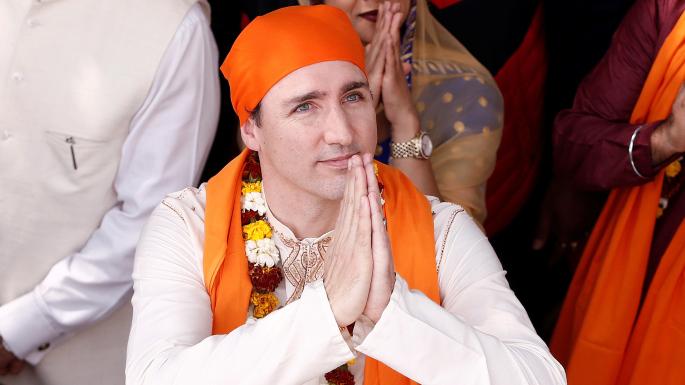 The 2015 Supreme Court decision in United States v Windsor was a watershed moment ushering in marriage equality across the entire US, which has been the greatest civil rights achievement in my lifetime. My understanding of how this happened was that activists opened up the hearts and minds of their friends and family to see them as people fully deserving of equality, not just someone exclusively (and usually negatively) defined by who they love. Once a critical mass of people changed their minds, politics followed, and what was once unthinkable became the law of the land. Bizarrely in the late 2010s following this amazing victory, there was a rise of "woke" people who threw away this successful playbook and instead weaponized language and demonized anyone who crossed them. Ostensibly "the woke" are fighting for justice, civil rights, and a better future. In reality, they have abandoned the tried and true tactics of love, compassion, and openness and have instead embraced a form of liberal fascism. They would rather thow a person away than try to change their mind. It's impossible to have productive discussions around topics of identity in public spaces without getting scolded by "the woke". For someone like myself who wants our society to continue to evolve into a more inclusive one, it pains me that "the woke" are so wrapped up in winning arguments on twitter and canceling people that instead of making social progress they are instead creating resentment and hatred and preventing any progress from occuring. Like Barack Obama, I think that "being woke" is obviously ridiculous and I hope that "being woke" is a fad that finally dies out in the 2020s. I fear that I'm a dinosaur and that my views of the world are now embarrassingly obsolete and that the best thing I can do is shut up.
The 2015 Supreme Court decision in United States v Windsor was a watershed moment ushering in marriage equality across the entire US, which has been the greatest civil rights achievement in my lifetime. My understanding of how this happened was that activists opened up the hearts and minds of their friends and family to see them as people fully deserving of equality, not just someone exclusively (and usually negatively) defined by who they love. Once a critical mass of people changed their minds, politics followed, and what was once unthinkable became the law of the land. Bizarrely in the late 2010s following this amazing victory, there was a rise of "woke" people who threw away this successful playbook and instead weaponized language and demonized anyone who crossed them. Ostensibly "the woke" are fighting for justice, civil rights, and a better future. In reality, they have abandoned the tried and true tactics of love, compassion, and openness and have instead embraced a form of liberal fascism. They would rather thow a person away than try to change their mind. It's impossible to have productive discussions around topics of identity in public spaces without getting scolded by "the woke". For someone like myself who wants our society to continue to evolve into a more inclusive one, it pains me that "the woke" are so wrapped up in winning arguments on twitter and canceling people that instead of making social progress they are instead creating resentment and hatred and preventing any progress from occuring. Like Barack Obama, I think that "being woke" is obviously ridiculous and I hope that "being woke" is a fad that finally dies out in the 2020s. I fear that I'm a dinosaur and that my views of the world are now embarrassingly obsolete and that the best thing I can do is shut up.
Anti-Semitism
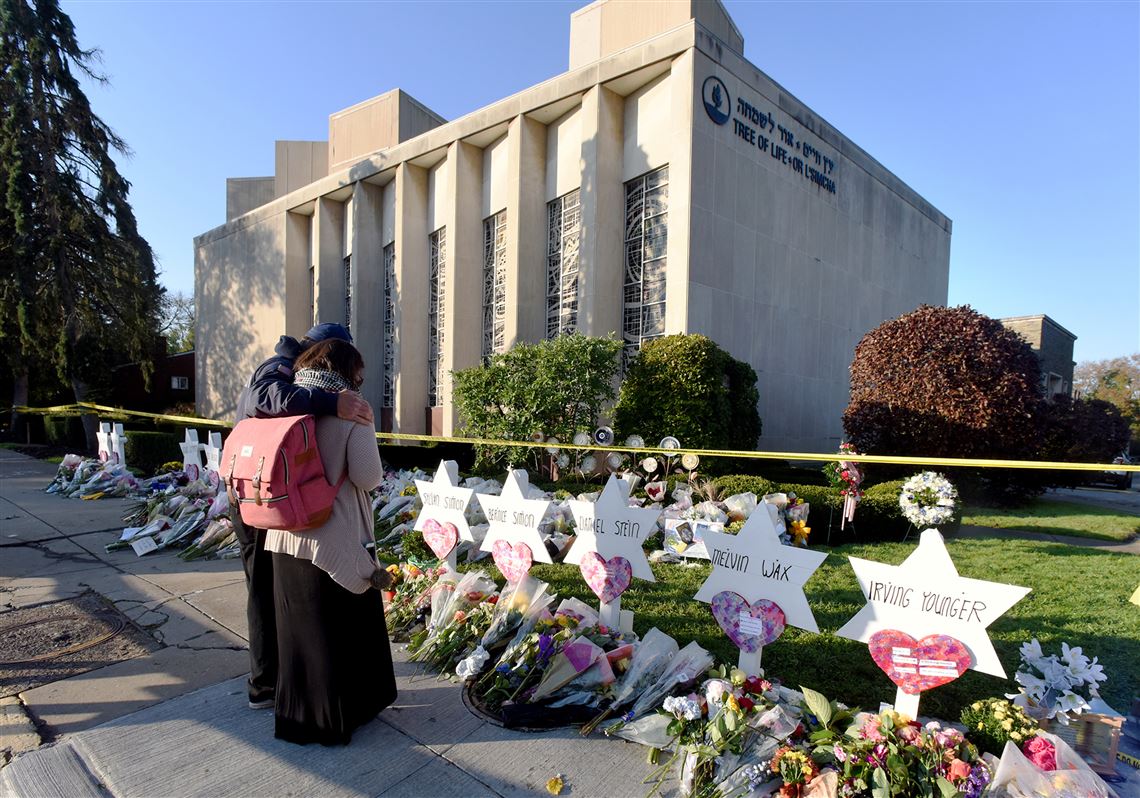 When I was younger I bought into the notion of progress only going in one direction - forward. I was inspired by the Martin Luther King Jr quote that "the arc of the moral universe is long, but it bends toward justice”. That worldview was overly simplistic and wrong, as the last 20 years have proven, with many bad things and setbacks that have occurred in the world at large. One of those things I thought was "only in the history books" was anti-Semitism. That was not only wrong at the time, but should be painfully obvious now that anti-Semitism is unfortunately on the rise. Despite being a tiny minority in the US, 60% of religious-based hate crimes were directed against Jews. From the right, there was the infamous "Jews will not replace us" white supremacist rally in Charlottesville, Donald Trump claiming that the neo-Nazis and white supremacists at that rally were very fine people, and of course the terrible 2018 incident where 11 Jews were killed at the Tree of Life Synagogue in Pittsburg. On the left 3 of the 4 Women's March founders were ousted for being anti-Semitic, a democratic member of congress engaged in anti-Semitic behavior and instead of being censured she was rallied behind, in the UK Jeremy Corbyn has turned the Labour Party into an anti-Semitic organization while in New York City, near daily attacks against Jews have occured, many by non-white youth. And as Fareed Zakaria has pointed out anti-Semitism has spread through the Islamic world like a cancer. Unfortunately the hate is coming from all sides, and it is reaching a fever pitch. I hope that the 2020s bring a renewed fight to one of the oldest hatreds around and a better understanding of the importance of Zionism and the safe haven Israel provides Jews. I fear that this is just the start of a long term trend of increasing hostility towards Jews and that people will dither by pointing to the "other side's anti-Semitism" instead of confronting it within their own communities.
When I was younger I bought into the notion of progress only going in one direction - forward. I was inspired by the Martin Luther King Jr quote that "the arc of the moral universe is long, but it bends toward justice”. That worldview was overly simplistic and wrong, as the last 20 years have proven, with many bad things and setbacks that have occurred in the world at large. One of those things I thought was "only in the history books" was anti-Semitism. That was not only wrong at the time, but should be painfully obvious now that anti-Semitism is unfortunately on the rise. Despite being a tiny minority in the US, 60% of religious-based hate crimes were directed against Jews. From the right, there was the infamous "Jews will not replace us" white supremacist rally in Charlottesville, Donald Trump claiming that the neo-Nazis and white supremacists at that rally were very fine people, and of course the terrible 2018 incident where 11 Jews were killed at the Tree of Life Synagogue in Pittsburg. On the left 3 of the 4 Women's March founders were ousted for being anti-Semitic, a democratic member of congress engaged in anti-Semitic behavior and instead of being censured she was rallied behind, in the UK Jeremy Corbyn has turned the Labour Party into an anti-Semitic organization while in New York City, near daily attacks against Jews have occured, many by non-white youth. And as Fareed Zakaria has pointed out anti-Semitism has spread through the Islamic world like a cancer. Unfortunately the hate is coming from all sides, and it is reaching a fever pitch. I hope that the 2020s bring a renewed fight to one of the oldest hatreds around and a better understanding of the importance of Zionism and the safe haven Israel provides Jews. I fear that this is just the start of a long term trend of increasing hostility towards Jews and that people will dither by pointing to the "other side's anti-Semitism" instead of confronting it within their own communities.
Cities
 San Fransisco should be the greatest city in the world right now. It is the epicenter of major technological innovation, contains highly open-minded and educated people, and is a place where risks are taken and failure is celebrated and learned from. However, due to political dysfunction the housing, transportation, and homelessness situations have made San Fransicso a place to be avoided. I have family living there and went 5 times in 2019, and I love the place, but it is hontesly a mess. New York, the city I love the most and I've called home for a long time now, is another city that should be a candidate for the best in the world. It's walkable, has a lot of energy and opportunity and a million things to do. However, under a hapless mayor and uninterested suburban overlord, it is dirty, unaffordable, hostile to business, and literally breaking. My pet theory is that these two cities are the poster child for failed liberal governance. I hope that in the 2020s something jolts these cities into action - either by electing a competent new mayor in NYC, or by a state initiative in CA to force SF into a sort of conservatorship run by a technocratic urbanist until it can self govern again. I fear that come 2030 these cities (once the crowning jewels of America) will still be resting on their laurels and stagnant while up and coming cities like Austin will continue to eat their lunch by absorbing all the population growth in the country.
San Fransisco should be the greatest city in the world right now. It is the epicenter of major technological innovation, contains highly open-minded and educated people, and is a place where risks are taken and failure is celebrated and learned from. However, due to political dysfunction the housing, transportation, and homelessness situations have made San Fransicso a place to be avoided. I have family living there and went 5 times in 2019, and I love the place, but it is hontesly a mess. New York, the city I love the most and I've called home for a long time now, is another city that should be a candidate for the best in the world. It's walkable, has a lot of energy and opportunity and a million things to do. However, under a hapless mayor and uninterested suburban overlord, it is dirty, unaffordable, hostile to business, and literally breaking. My pet theory is that these two cities are the poster child for failed liberal governance. I hope that in the 2020s something jolts these cities into action - either by electing a competent new mayor in NYC, or by a state initiative in CA to force SF into a sort of conservatorship run by a technocratic urbanist until it can self govern again. I fear that come 2030 these cities (once the crowning jewels of America) will still be resting on their laurels and stagnant while up and coming cities like Austin will continue to eat their lunch by absorbing all the population growth in the country.
Freedom of Consciousness
 It's political malpractice that a politican or party hasn't run on and enacted nationwide legalization of Marijuana with public support hovering at 66% in favor of this. The emerging research for other psychedelics such as MDMA, LSD, and Psilocybin are sure to change a lot of minds to the point where at least decriminalizing and perhaps legalizing them (at a minimum in a clinical setting) will be just as popular soon. I'm not sure the term "freedom of consiousness" will be used at all - but since there has yet to be a "marriage equality" caliber term for this movement that's what I'm calling it for now. I hope that in the 2020s all of these conscious altering substances are legalized, regulated, and responsibly used. I fear that fear, uncertainty, and doubt or greed over the bonanza of tax revenue will ruin this and stall progress for part of if not the entire decade.
It's political malpractice that a politican or party hasn't run on and enacted nationwide legalization of Marijuana with public support hovering at 66% in favor of this. The emerging research for other psychedelics such as MDMA, LSD, and Psilocybin are sure to change a lot of minds to the point where at least decriminalizing and perhaps legalizing them (at a minimum in a clinical setting) will be just as popular soon. I'm not sure the term "freedom of consiousness" will be used at all - but since there has yet to be a "marriage equality" caliber term for this movement that's what I'm calling it for now. I hope that in the 2020s all of these conscious altering substances are legalized, regulated, and responsibly used. I fear that fear, uncertainty, and doubt or greed over the bonanza of tax revenue will ruin this and stall progress for part of if not the entire decade.
Looming Catastrophe
 The single most earth-shattering event of my life was 9/11. I'll never forget seeing the towers collapse live on national TV, and am still furious at the unnecessary Invasion of Iraq that followed. Luckily, no single event remotely as bad happened in the 2010s, although many slow-moving crises such as the Syrian Civil War were still devasting. Maybe I'm just as shaped by 9/11 and the Great Recession as my grandparent's generation was by the Great Depression and WWII, but I'm still waiting for "the other shoe to drop" and some catastrophe to befall us again. I hope that there is no such disaster in the 2020s (caused either by humans or nature). I fear that every day there is not such an event, the likelihood it comes tomorrow increases.
The single most earth-shattering event of my life was 9/11. I'll never forget seeing the towers collapse live on national TV, and am still furious at the unnecessary Invasion of Iraq that followed. Luckily, no single event remotely as bad happened in the 2010s, although many slow-moving crises such as the Syrian Civil War were still devasting. Maybe I'm just as shaped by 9/11 and the Great Recession as my grandparent's generation was by the Great Depression and WWII, but I'm still waiting for "the other shoe to drop" and some catastrophe to befall us again. I hope that there is no such disaster in the 2020s (caused either by humans or nature). I fear that every day there is not such an event, the likelihood it comes tomorrow increases.
Trumpism
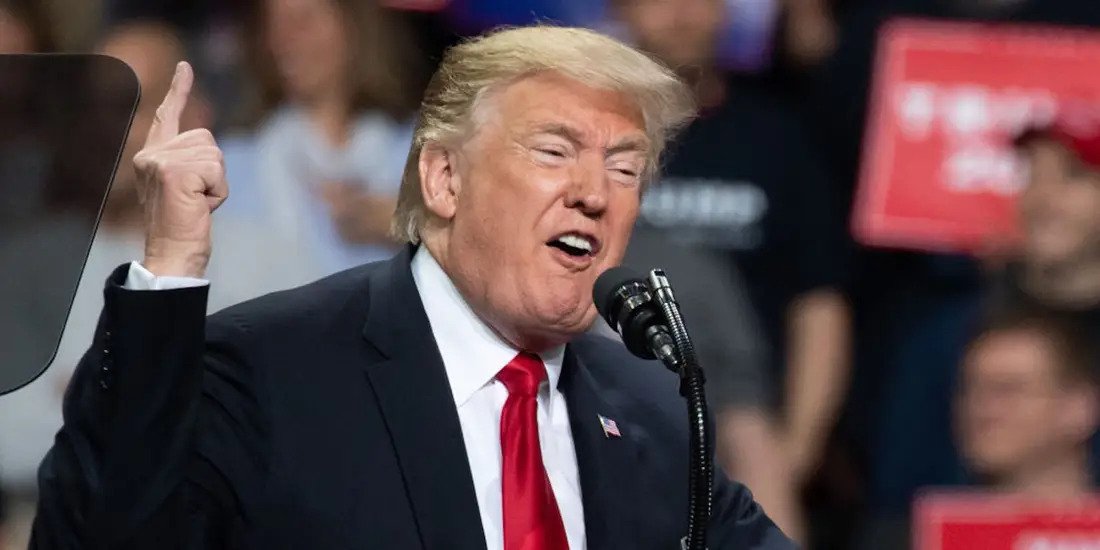 The US must rid itself of Donald Trump immediately. When many thought he was a joke, I was terrified of him, and unfortunately I was right. He lies at an unprecedented rate and with unnerving ease, is historically corrupt, is unpredictable, embarrasses the US constantly, degrades himself and others on a daily basis, sides with geopolitical enemies over allies, is surrounded by sadistic incompetent sycophants (not to mention the hordes of former associates now in jail), is cruel seemingly for the fun of it, intentionally sows the seeds of division between Americans, abused his power and then tried to cover it up, and most terrifyingly is a charismatic demagogue that a significant minority of Americans support with eyes wide open to all of that. I haven't even mentioned the countless policy disagreements I have with Trump since this is bigger than that. People in the US take its stable political system for granted, but Trump's success has exposed its fragility and should give everyone pause. I hope that Donald Trump does not get reelected and that Trumpism dies and never comes back. I fear that win or lose, the forces that animated Trump will be harnessed by either an unhinged reelected Trump or by someone much more cunning and knowledgable about wielding power in the future.
The US must rid itself of Donald Trump immediately. When many thought he was a joke, I was terrified of him, and unfortunately I was right. He lies at an unprecedented rate and with unnerving ease, is historically corrupt, is unpredictable, embarrasses the US constantly, degrades himself and others on a daily basis, sides with geopolitical enemies over allies, is surrounded by sadistic incompetent sycophants (not to mention the hordes of former associates now in jail), is cruel seemingly for the fun of it, intentionally sows the seeds of division between Americans, abused his power and then tried to cover it up, and most terrifyingly is a charismatic demagogue that a significant minority of Americans support with eyes wide open to all of that. I haven't even mentioned the countless policy disagreements I have with Trump since this is bigger than that. People in the US take its stable political system for granted, but Trump's success has exposed its fragility and should give everyone pause. I hope that Donald Trump does not get reelected and that Trumpism dies and never comes back. I fear that win or lose, the forces that animated Trump will be harnessed by either an unhinged reelected Trump or by someone much more cunning and knowledgable about wielding power in the future.
Minoritarian Rule in the US
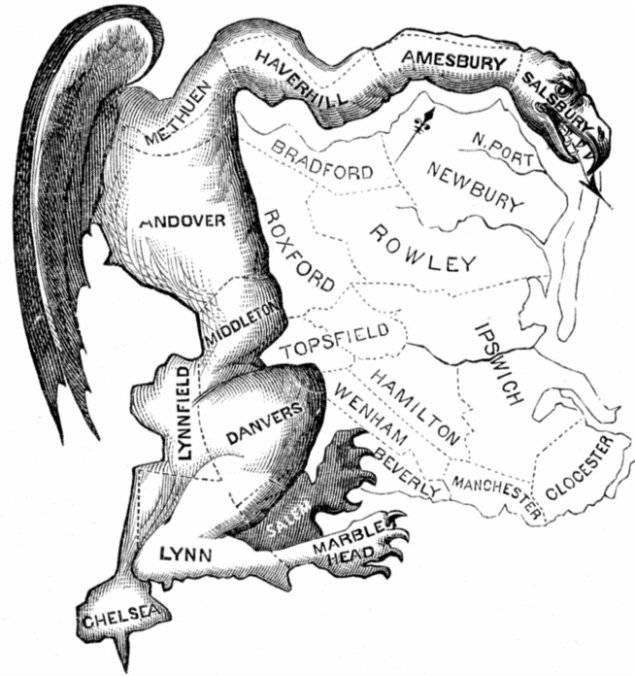 In the US the 2010s felt like a setback for the ideals of democracy that I still hold onto. The unfair but hard to change rules governing elections (gerrymandering, the electoral college, the existence of the US Senate) in the US has led to an empowered minority (the Republican party) running the government while the frustrated majority have been sidelined. In numerous election cycles Democrats won more votes for house and senate seats but found themselves in the minority. California (with a population of 40 million), a Democratic state, has two senate seats while the former Dakota Territory (with a population of under 2 million), both Republican states, has 4. Two of the last five presidential elections have gone to the loser of the popular vote (both Republicans). It is unsustainable to have this sort of mismatch that continues to give power to a minority political faction and has driven many to lose faith in "the system". I hope that by 2030 the US solves a large chunk of this problem through political reforms such as the National Popular Vote Interstate Compact, adopting state-based nonpartisan redistricting processeses, and even admitting new states such as DC and Puerto Rico. I fear that political reform will not be a top priority the status quo will hold for another frustrating decade.
In the US the 2010s felt like a setback for the ideals of democracy that I still hold onto. The unfair but hard to change rules governing elections (gerrymandering, the electoral college, the existence of the US Senate) in the US has led to an empowered minority (the Republican party) running the government while the frustrated majority have been sidelined. In numerous election cycles Democrats won more votes for house and senate seats but found themselves in the minority. California (with a population of 40 million), a Democratic state, has two senate seats while the former Dakota Territory (with a population of under 2 million), both Republican states, has 4. Two of the last five presidential elections have gone to the loser of the popular vote (both Republicans). It is unsustainable to have this sort of mismatch that continues to give power to a minority political faction and has driven many to lose faith in "the system". I hope that by 2030 the US solves a large chunk of this problem through political reforms such as the National Popular Vote Interstate Compact, adopting state-based nonpartisan redistricting processeses, and even admitting new states such as DC and Puerto Rico. I fear that political reform will not be a top priority the status quo will hold for another frustrating decade.
Islam vs The World
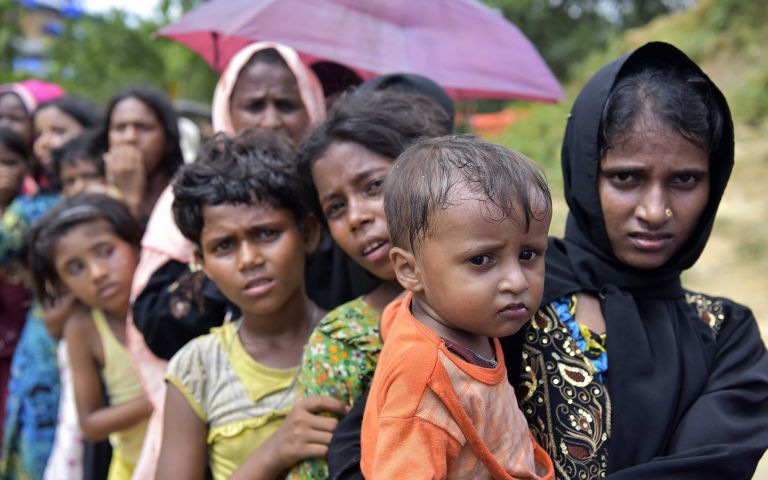 Most discussion around Islam in the US is centered around 9/11 and the subsequent War on Terror. While this focus is unfortunately narrow and the history is indeed complicated, the threat of radical Islamic jihadists is very much real, as the families of the 3,000 people who died on 9/11 know all too well, and seemingly intractable. However, zooming back and thinking just about the last few years alone there has also been a troubling trend around Muslim minorities in countries around the world - being subjected to repression. From the internment camps for Uyghurs in China, to the ethnic cleansing of the Rohingya in Myanmar, to the emerging situation in India with respect to Kashmir and the Citizenship bill, not to mention the travel ban in the US. This is all very worrying and headed in a seemingly worse and worse direction every day. I hope that in the 2020s the idea of peaceful coexistence reemerges as a potent political force and at least a cold peace is achieved. I fear that my hopes are a pipe dream from a John Lennon bed-in and that we are in a vicious cycle of radical Islamists engaging in terror against non-Muslim countries, who in turn treat the Muslim minorities within their countries crueler and crueler until something unimaginably terrible happens.
Most discussion around Islam in the US is centered around 9/11 and the subsequent War on Terror. While this focus is unfortunately narrow and the history is indeed complicated, the threat of radical Islamic jihadists is very much real, as the families of the 3,000 people who died on 9/11 know all too well, and seemingly intractable. However, zooming back and thinking just about the last few years alone there has also been a troubling trend around Muslim minorities in countries around the world - being subjected to repression. From the internment camps for Uyghurs in China, to the ethnic cleansing of the Rohingya in Myanmar, to the emerging situation in India with respect to Kashmir and the Citizenship bill, not to mention the travel ban in the US. This is all very worrying and headed in a seemingly worse and worse direction every day. I hope that in the 2020s the idea of peaceful coexistence reemerges as a potent political force and at least a cold peace is achieved. I fear that my hopes are a pipe dream from a John Lennon bed-in and that we are in a vicious cycle of radical Islamists engaging in terror against non-Muslim countries, who in turn treat the Muslim minorities within their countries crueler and crueler until something unimaginably terrible happens.
Democracy around the Globe
 My thinking around democracy has changed a lot. I used to believe in a sort of End of History where all countries would eventually become a democracy and then things would be great. Obviously that is not what happened, and in fact, a third of the world lives in a country with democratic backsliding. It used to be easy to identify (and of course mock) dictators claiming to run a democracy yet conveniently would always win 99% of the vote. But it's not so simple today. For example, Vladimir Putin seems legitimately popular, but his political opponents also seem to die under mysterious circumstances. America believes in "one person, one vote" yet as I wrote above, two of the last five presidential elections went to the loser of the popular vote. Brexit was supported by a majority of British voters (and recently reaffirmed with the election of Boris Johnson), yet there was a disinformation campaign run in favor of it that perhaps helped put it over the top in the first place. Democracy is a frustrating mess, and these type of murky issues make it that much harder to wade through, but for now, it's the best political system we've got. I hope in the 2020s democracy will be restored, expanded, and renewed - most likely by a coalition of idealistic young people, who strive for something better, and older people, who've seen better days and want a restoration. I fear that many people will give up on democracy and give their support to radical forms of government such as dictatorship, communism, or nationalism.
My thinking around democracy has changed a lot. I used to believe in a sort of End of History where all countries would eventually become a democracy and then things would be great. Obviously that is not what happened, and in fact, a third of the world lives in a country with democratic backsliding. It used to be easy to identify (and of course mock) dictators claiming to run a democracy yet conveniently would always win 99% of the vote. But it's not so simple today. For example, Vladimir Putin seems legitimately popular, but his political opponents also seem to die under mysterious circumstances. America believes in "one person, one vote" yet as I wrote above, two of the last five presidential elections went to the loser of the popular vote. Brexit was supported by a majority of British voters (and recently reaffirmed with the election of Boris Johnson), yet there was a disinformation campaign run in favor of it that perhaps helped put it over the top in the first place. Democracy is a frustrating mess, and these type of murky issues make it that much harder to wade through, but for now, it's the best political system we've got. I hope in the 2020s democracy will be restored, expanded, and renewed - most likely by a coalition of idealistic young people, who strive for something better, and older people, who've seen better days and want a restoration. I fear that many people will give up on democracy and give their support to radical forms of government such as dictatorship, communism, or nationalism.
Global Poverty
 Muhammad Yunus had a goal of eradicating poverty so that by 2030 the world could literally create a poverty museum to explain to future generations what poverty was. We have been able to make huge strides in this fight over the last few decades, but there are still major hurdles preventing us from accomplishing this in the next 10 years, especially in some African countries. I hope that the world will act constructively and provide the necessary resources and display the political courage to make poverty a thing of the past. I fear that too many rich countries will continue to provide aid instead of expand trade and that too many poor countries are simply too dysfunctional or corrupt to make the necessary changes fast enough, leaving hundreds of millions of humans still suffering in poverty at the end of this decade.
Muhammad Yunus had a goal of eradicating poverty so that by 2030 the world could literally create a poverty museum to explain to future generations what poverty was. We have been able to make huge strides in this fight over the last few decades, but there are still major hurdles preventing us from accomplishing this in the next 10 years, especially in some African countries. I hope that the world will act constructively and provide the necessary resources and display the political courage to make poverty a thing of the past. I fear that too many rich countries will continue to provide aid instead of expand trade and that too many poor countries are simply too dysfunctional or corrupt to make the necessary changes fast enough, leaving hundreds of millions of humans still suffering in poverty at the end of this decade.
See you in 10 years!
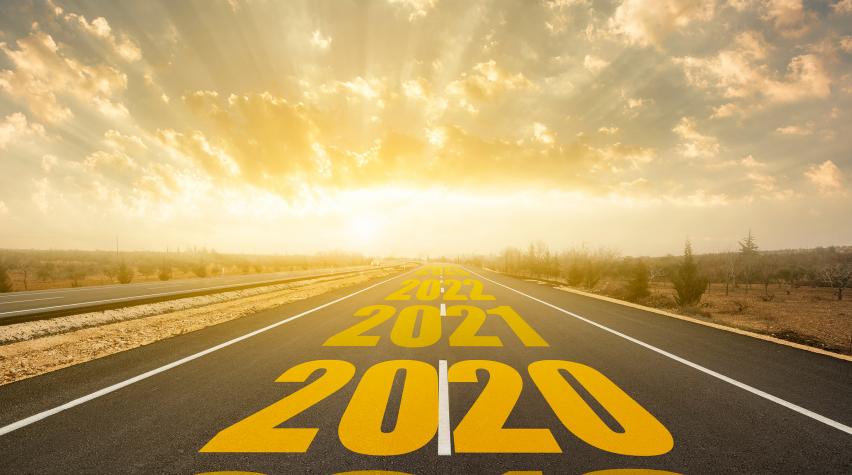 Anyway, I'll check back on this 10 years from now. I'm curious what I got right, what I got wrong, and what I missed. Hope the next decade is amazing!
Anyway, I'll check back on this 10 years from now. I'm curious what I got right, what I got wrong, and what I missed. Hope the next decade is amazing!